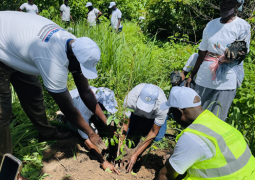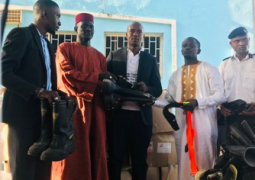
The training is one of a series of activities required for the implementation of the project per the MoU signed between the SRPEP and DLS.
A total of 150 farmers actively involved in small ruminant production and productivity across the six agricultural regions of the country would be trained (in three batches of 50 participants each) for a period of 15 days (5 days for each set.)
The overall objective of the training is to enhance the capacity of small ruminant farmers on small ruminant production and productivity, herd and reproductive management. The training will focus on disease identification and prevention; breeding and reproductive health management; small ruminant commercial farming; feeding and nutrition; and pasture to contribute to the improvement of livelihood of rural farmers and peri-urban communities in The Gambia by strengthening the productivity and resilience of pastoral systems and stimulating entrepreneurship in the livestock sector through the enhancement of small ruminant production.
The training is also designed to improve the knowledge and competencies of livestock farmers on key techniques in small ruminant breeding, disease prevention and control at herd level, ruminant reproductive health management, feeding and nutritional management, pasture and forage development and management.
Kawsu Sanyang, national focal point for the project said the training would enhance the capacity of livestock farmers on herd management including selection of appropriate feed and supplements, small ruminant disease identification and implementations of sanitary and control measures at herd level.
He added that the training would also equip farmers with the relevant knowledge and skills in building and maintenance of appropriate housing structures, in particular, technologies involved such as raised platform housing that can enhance small ruminant production and productivity through reduction of diseases incidence and improvement of herd management.
Madou Camara, regional livestock director for Lower River Region described the training as important for the project and therefore called on participants to ensure the knowledge gained from the training reflect on their farming when they return. He also urged them to share the knowledge gained for the sustainability of the project.
Nenny Corr, livestock value chain specialist, Small Ruminant Production Enhancement Project (SRPEP) said the project would make available infrastructure that would enhance production of small ruminant, reduce mortality of small ruminant due to diseases, establish markets, establish community pastures, and provide loans for farmers.
He added that the training would also expose rural farmers to skills and ideas required for a paradigm shift from traditional subsistence farming to commercial/business-oriented systems of small ruminant farming.
Emmanuel W. Mendy, deputy director general animal production at the Department of Livestock Services called for the need to stop the importation of rams for feasts in the country, saying it is not good for the country’s foreign savings.
Mr. Mendy added that to address the small ruminant production and productivity gaps in the country, there is a need to empower small ruminant farmers in the country which the project aims at.He also expressed their readiness to work with beneficiary farms in ensuring the success of the project.





